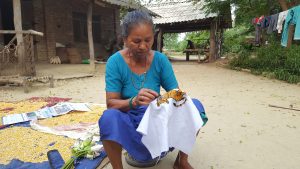For my next blog posts, I will be highlighting two women in the Bardiya Conflict Victims Embroidery Cooperative who kindly agreed to share their stories with me. During our first trip to Bardiya, Sarita, Prabal, and I took a rickshaw to Belmati Tharu’s house in Basgadi. When we arrived, Belmati and her family were going about their daily housework. Prabal, Sarita, Belmati, and I sat outside on straw stools. Next to us was a piece of cloth with hundreds of kernels of corn. She and Sarita talked for a few minutes, and then Sarita explained that we wanted to ask her some questions for a video about NEFAD’s work.
Belmati maintained a sad look on her face through the entirety of our conversation, so I asked Prabal multiple times if it was acceptable for us to interview her. He and Sarita reassured me that it was and added that Belmati is generally a very somber person. Hesitantly, I asked my first question, and Prabal and Sarita translated.
Belmati explained that she lives with her two sons, two daughter-in-laws, and three grandchildren. In the morning, she cleans the house and takes care of her grandchildren, so her daughter-in-laws can go to the field for agricultural work. Belmati’s third son was forcibly disappeared in March 2001. In July 2001, her daughter-in-law was also disappeared. In September, her eldest daughter-in-law was disappeared.
She spoke specifically about her son’s disappearance. She explained that he had a problem in his stomach and that it was difficult to afford heath care. They didn’t have an economic cushion to address hardship. She explained that the people from the Maoist party came to him and asked him for some help. He helped them with the expectation that he would receive treatment for his stomach. While he was on his way to a follow-up medical checkup, he was arrested from Kohalpur Chauraha. It’s still difficult for Belmati when she remembers them. She mentioned that her home and her family would be happier if they were alive.
Belmati showing us her tiger square
After she explained the disappearances, I asked about her participation in the embroidery cooperative. Belmati explained that it’s nice to be with other people who have had similar experiences of the conflict. She told us that she enjoys doing the embroidery, but it’s increasingly challenging due to her age. She expresses that if they could regularly work on the embroidery, it would be a better way to make money, at least to purchase some groceries.
Despite the embroidery being a challenge for her, she is working on a tiger square. After discussing the embroidery cooperative, Belmati went into her house to get the square she is working on. She and Sarita discussed the areas for improvement. She’s currently fixing the square, which will be made into a tiger bag once it’s complete.
To support women like Belmati in continuing the embroidery work, please visit and share our Global Giving page where we are raising money for embroidery supplies.
Posted By Komal Thakkar (Nepal)
Posted Aug 28th, 2018



1 Comment
Corinne Cummings
August 29, 2018
Hi Komal — welcome back home! Thank you for your blogs, it was a pleasure to read about your experiences and your thoughts. I learned a great deal. I am happy you had the opportunity to meet and talk with Belmati — I remember her story very well from the profiles. I appreciate that she talked about her story again, as there are some details that I was unaware of. I am so happy that she is continuing to participate in the embroidery cooperative. Her work is excellent! Thank you for sharing her account, Komal. Best, Corinne